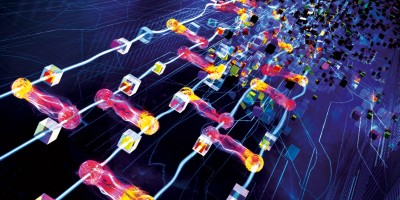


Data availability
The data for reproducing this work are available at https://github.com/condensedAI/quantumzero (ref. 15).
Code availability
The code can be found at https://github.com/condensedAI/quantumzero (ref. 15).
References
Silver, D. et al. Mastering the game of Go without human knowledge. Nature 550, 354–359 (2017).
Silver, D. et al. A general reinforcement learning algorithm that masters chess, shogi, and Go through self-play. Science 362, 1140–1144 (2018).
Chen, Y.-Q. et al. Optimizing quantum annealing schedules with Monte Carlo tree search enhanced with neural networks. Nat. Mach. Intell. 4, 269–278 (2022).
Kirkpatrick, S. & Selman, B. Critical behavior in the satisfiability of random boolean expressions. Science 264, 1297–1301 (1994).
Das, A. & Chakrabarti, B. K. Quantum Annealing and Related Optimization Methods Vol. 679 (Springer, 2005).
Morita, S. & Nishimori, H. Mathematical foundation of quantum annealing. J. Math. Phys. 49, 125210 (2008).
Chen, Y.-Q., Chen, Y., Lee, C.-K., Zhang, S. & Hsieh, C.-Y. QuantumZero Code Repository (GitHub, 2022); https://github.com/yutuer21/quantumzero
Nocedal, J. & Wright, S. Numerical Optimization (Springer, 2006).
Bukov, M. et al. Reinforcement learning in different phases of quantum control. Phys. Rev. X 8, 031086 (2018).
Halperin, E., Livnat, D. & Zwick, U. MAX CUT in cubic graphs. J. Algorithms 53, 169–185 (2004).
Zhou, L., Wang, S.-T., Choi, S., Pichler, H. & Lukin, M. D. Quantum approximate optimization algorithm: performance, mechanism, and implementation on near-term devices. Phys. Rev. X 10, 021067 (2020).
Cerezo, M. et al. Variational quantum algorithms. Nat. Rev. Phys. 3, 625–644 (2021).
Uvarov, A. V. & Biamonte, J. D. On barren plateaus and cost function locality in variational quantum algorithms. J. Phys. A 54, 245301 (2021).
Mele, A. A., Mbeng, G. B., Santoro, G. E., Collura, M. & Torta, P. Avoiding barren plateaus via transferability of smooth solutions in Hamiltonian Variational Ansatz. Preprint at https://arxiv.org/abs/2206.01982 (2022).
CondensedAI/Quantumzero Code Repository (GitHub, 2022); https://github.com/condensedAI/quantumzero
Acknowledgements
M.W. was supported by the Villum Foundation (research grant no. 25310). This project received funding from the European Union’s Horizon 2020 research and innovation program under the Marie Sklodowska-Curie grant agreement no. 847523 ‘INTERACTIONS’.
Author information
Authors and Affiliations
Contributions
MMW performed the simulations and analyzed the data. Both authors contributed to writing the code and interpreting the data and to the writing.
Corresponding author
Ethics declarations
Competing interests
The authors declare no competing interests.
Peer review
Peer review information
Nature Machine Intelligence thanks the anonymous reviewers for their contribution to the peer review of this work.
Additional information
Publisher’s note Springer Nature remains neutral with regard to jurisdictional claims in published maps and institutional affiliations.
Rights and permissions
About this article
Cite this article
Wauters, M.M., van Nieuwenburg, E. Reusability report: Comparing gradient descent and Monte Carlo tree search optimization of quantum annealing schedules. Nat Mach Intell 4, 810–813 (2022). https://doi.org/10.1038/s42256-022-00535-y
Received:
Accepted:
Published:
Issue Date:
DOI: https://doi.org/10.1038/s42256-022-00535-y
- Springer Nature Limited


